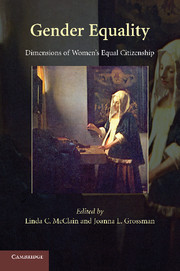Book contents
- Frontmatter
- Contents
- Contributors
- Acknowledgments
- Gender Equality
- Introduction
- PART I CONSTITUTIONAL CITIZENSHIP AND GENDER
- 1 Gender at the Margins of Contemporary Constitutional Citizenship
- 2 Becoming a Citizen: Marriage, Immigration, and Assimilation
- 3 Women's Civic Inclusion and the Bill of Rights
- 4 Must Feminists Identify as Secular Citizens? Lessons From Ontario
- 5 Feminist Fundamentalism and Constitutional Citizenship
- PART II POLITICAL CITIZENSHIP AND GENDER
- PART III SOCIAL CITIZENSHIP AND GENDER
- PART IV SEXUAL AND REPRODUCTIVE CITIZENSHIP
- PART V GLOBAL CITIZENSHIP AND GENDER
- Suggested Readings
- Index
- References
4 - Must Feminists Identify as Secular Citizens? Lessons From Ontario
Published online by Cambridge University Press: 05 August 2012
- Frontmatter
- Contents
- Contributors
- Acknowledgments
- Gender Equality
- Introduction
- PART I CONSTITUTIONAL CITIZENSHIP AND GENDER
- 1 Gender at the Margins of Contemporary Constitutional Citizenship
- 2 Becoming a Citizen: Marriage, Immigration, and Assimilation
- 3 Women's Civic Inclusion and the Bill of Rights
- 4 Must Feminists Identify as Secular Citizens? Lessons From Ontario
- 5 Feminist Fundamentalism and Constitutional Citizenship
- PART II POLITICAL CITIZENSHIP AND GENDER
- PART III SOCIAL CITIZENSHIP AND GENDER
- PART IV SEXUAL AND REPRODUCTIVE CITIZENSHIP
- PART V GLOBAL CITIZENSHIP AND GENDER
- Suggested Readings
- Index
- References
Summary
Introduction
Must feminists identify as secular citizens? Conceptualizing citizenship as secular is a recent phenomenon. There is no reason to advert to the secularism of liberal citizens because distinguishing secularism from religion and affirming secularism are two defining features of liberal states. However, the revitalization of religion in the public sphere portends a postsecular state in which some citizens will opt to participate as religious adherents. Recently, the Canadian province of Ontario appeared to become postsecular when some religious adherents initiated a political campaign for recognition of Sharia family arbitration. Since feminists participated actively in the ensuing political deliberations, my objective in this chapter is to identify them and to explore the implications of postsecularism for their citizenship.
Theories of citizenship abound. However, one of the few scholars to theorize postsecular citizenship is Jürgen Habermas. According to Habermas, the postsecular state is constituted by religious lobbyists and their secular opponents. Because the advocates of Sharia family arbitration met his criteria for religious citizenship, I focus on their secular opponents, who were mainly feminists. The debate between these religious citizens and secular feminists resembled the deliberations that Habermas would attribute to a postsecular state. Presumably he would also find the outcome of this debate – Ontario imposed a ban on all faith-based family arbitrations – consistent with postsecularism.
This outcome did not please some religious citizens, who threaten to challenge its constitutionality by invoking their guarantee of religious freedom under the Canadian Charter of Rights and Freedoms.
- Type
- Chapter
- Information
- Gender EqualityDimensions of Women's Equal Citizenship, pp. 83 - 106Publisher: Cambridge University PressPrint publication year: 2009
References
- 5
- Cited by



